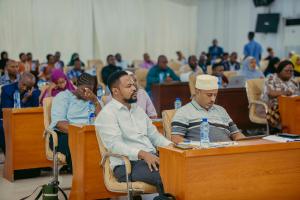TangaYetu Program Launches New Projects Under Phase II to Deepen Youth Empowerment and Urban Transformation
TangaYetu has launched four new projects under its Phase II program to boost youth empowerment and drive inclusive urban development in Tanga City.
TANGA, TANGA CITY, TANZANIA, May 24, 2025 /EINPresswire.com/ -- The TangaYetu program has officially launched four new projects as part of its second phase of implementation. The projects aim to strengthen inclusive service delivery, promote youth livelihoods, and accelerate Tanga’s progress as a city where young people can live, learn, and lead meaningful change.
The launch event, held at Regal Naviera Hotel in Tanga, brought together more than 180 participants, including representatives from the government, civil society, youth-led organizations, and development partners. The projects—focused on education, environmental sustainability, blue economy, and digital skills represent the program’s continued investment in practical, community-led solutions to urban challenges.
“These interventions build on the momentum of Phase I by responding to local needs and priorities through collaborative design and youth participation,” said Mr. Patrick Msumary, Program Coordinator at TangaYetu
Project Overviews
Enhancing Learning Outcomes in Public Primary Schools
This two-year initiative, led by Dr. Godfrey Telli, focuses on improving foundational literacy and numeracy through the Teaching at the Right Level (TaRL) methodology. The project will reach 83 public primary schools across Tanga City and build the capacity of education officers, school heads, and teachers to adapt learning to the individual needs of students.
“This initiative is not just about improving test scores—it’s about restoring hope, ensuring children are learning, and equipping teachers and schools with the tools to succeed,” said Dr. Telli.
Kijana na Mazingira Project
Implemented by Zaidi Recyclers and TakaNiAjira Foundation, this 18-month project will engage 200 young people—50% of them women—in sustainable waste management. It will support the creation of 10 community waste banks and a Material Recovery Facility, leveraging digital tools such as the Zaidi App to promote recycling and generate income for youth.
“This project is about building a circular economy powered by youth,” said Franken Kalongole, Co-Founder of TakaNiAjira Foundation. “We’re transforming waste into value—socially, economically, and environmentally. With digital tools and community mobilization, we’re giving young people the power to lead change at the grassroots.”
Youth Economic Empowerment Through the Blue Economy
This project, managed by Tanga Fish Aqua Company in partnership with local youth, focuses on developing sustainable marine value chains. It includes training and support in seaweed processing, crab farming, and sardine drying. The initiative aims to improve incomes while promoting climate-conscious practices in coastal communities.
“Our coastal communities have long depended on the ocean for their livelihoods, yet opportunities for youth have remained limited,” said Mr. Omary Masomaso, Director of Tanga Fish Aqua. “Through this project, we’re not only building sustainable aquaculture practices, but we’re restoring dignity and economic hope among young people—especially women—along Tanga’s shores.”
Kidijitali Project: Digital Skills for Sustainable Entrepreneurship
Led by Swahili Digital ICT Limited and the Tanga City Council, this 12-month project will train 250 youth in digital marketing, e-commerce, and business development. A Digital Innovation Hub will be established to provide ongoing access to tools and mentorship, with a goal of supporting the launch of at least 100 youth-led online businesses.
“Digital skills are no longer a luxury—they are essential for survival and growth in today’s economy,” said Mr. Gillsant Mlaseko, Director of Swahili Digital. “With the support of TangaYetu, we’re helping youth move from passive consumers of technology to active innovators, job creators, and online entrepreneurs.”
The four projects reflect the strategic focus areas of TangaYetu Phase II, which include Economic Empowerment, Educational Enhancement, Technology and Innovation, Social and Community Engagement, Environmental Sustainability, and Health and Well-being. Together, they demonstrate the program’s commitment to inclusive urban development, evidence-informed action, and long-term youth empowerment.
The TangaYetu program is funded by Fondation Botnar managed by INNOVEX Development Consulting Limited in collaboration with Tanga City Council, making Tanga a City where youth thrive.
For more information, visit www.tangayetu.or.tz
Gillsant Mlaseko
Swahili Digital
email us here
Visit us on social media:
LinkedIn
Instagram
X
Legal Disclaimer:
EIN Presswire provides this news content "as is" without warranty of any kind. We do not accept any responsibility or liability for the accuracy, content, images, videos, licenses, completeness, legality, or reliability of the information contained in this article. If you have any complaints or copyright issues related to this article, kindly contact the author above.
KRAMBU, Inc. Sponsors Open WebUI to Accelerate Open-Source AI Innovation
Loyola AI’s New No-code AI Loan Processing Platform at Conference
Immersive in Miami - Maroon Isle Productions Presents JEALOUSY: A Halloween Dinner Theater Show
Więcej ważnych informacji
 Jedynka Newserii
Jedynka Newserii

 Jedynka Newserii
Jedynka Newserii

Handel

Mercosur to tylko wierzchołek góry lodowej. UE ma ponad 40 umów handlowych, które mogą destabilizować rynek rolny
Umowa handlowa między UE a krajami Mercosur może znacząco zaburzyć konkurencję na rynku rolnym i osłabić pozycję unijnych, w tym polskich, producentów – ostrzegają rolnicy i producenci żywności. Umowie sprzeciwia się część krajów unijnych, które domagają się klauzuli ochronnych oraz limitów importowych. – Problemem jest jednak nie tylko ta konkretna umowa. Chodzi o cały system wolnego handlu, który się kumuluje z dziesiątek innych porozumień – podkreśla Andrzej Gantner, wiceprezes Polskiej Federacji Producentów Żywności.
Firma
Dzięki zdalnej weryfikacji tożsamości z wykorzystaniem AI firmy zminimalizowały liczbę oszustw. Rozwiązania wykorzystuje głównie sektor finansowy

Z najnowszych danych Eurostatu wynika, że w 2024 roku 5,9 proc. polskich firm korzystało z rozwiązań z zakresu sztucznej inteligencji. W 2023 roku był to odsetek na poziomie 3,67 proc. Wciąż jednak jest to wynik poniżej średniej unijnej, która wyniosła 13,48 proc. Jednym z obszarów, który cieszy się coraz większym zainteresowaniem wśród przedsiębiorców, jest weryfikacja tożsamości przez AI, zwłaszcza w takich branżach jak bankowość, ubezpieczenia czy turystyka. Jej zastosowanie ma na celu głównie przeciwdziałać oszustwom i spełniać wymogi regulacyjne.
Prawo
Daniel Obajtek: Własne wydobycie i operacyjne magazyny to filary bezpieczeństwa. Zgoda na magazyny gazu poza krajem to rezygnacja z suwerenności energetycznej

Były prezes Orlenu ostrzega przed zmianami w ustawie o zapasach ropy naftowej, produktów naftowych i gazu ziemnego. Jego zdaniem przygotowana przez rząd nowelizacja tzw. ustawy magazynowej i ujednolicanie unijnej polityki energetycznej to zagrożenie dla bezpieczeństwa energetycznego Polski. W jego opinii tylko silna spółka narodowa, własne wydobycie, krajowe magazyny i zbilansowany miks energetyczny zapewnią Polsce bezpieczeństwo i konkurencyjność.
Partner serwisu
Szkolenia

Akademia Newserii
Akademia Newserii to projekt, w ramach którego najlepsi polscy dziennikarze biznesowi, giełdowi oraz lifestylowi, a także szkoleniowcy z wieloletnim doświadczeniem dzielą się swoją wiedzą nt. pracy z mediami.





![Nestlé w Polsce podsumowuje wpływ na krajową gospodarkę. Firma wygenerowała 0,6 proc. polskiego PKB [DEPESZA]](https://www.newseria.pl/files/1097841585/fabryka-nesquik_1,w_85,r_png,_small.png)



.gif)

 |
| |
| |
|